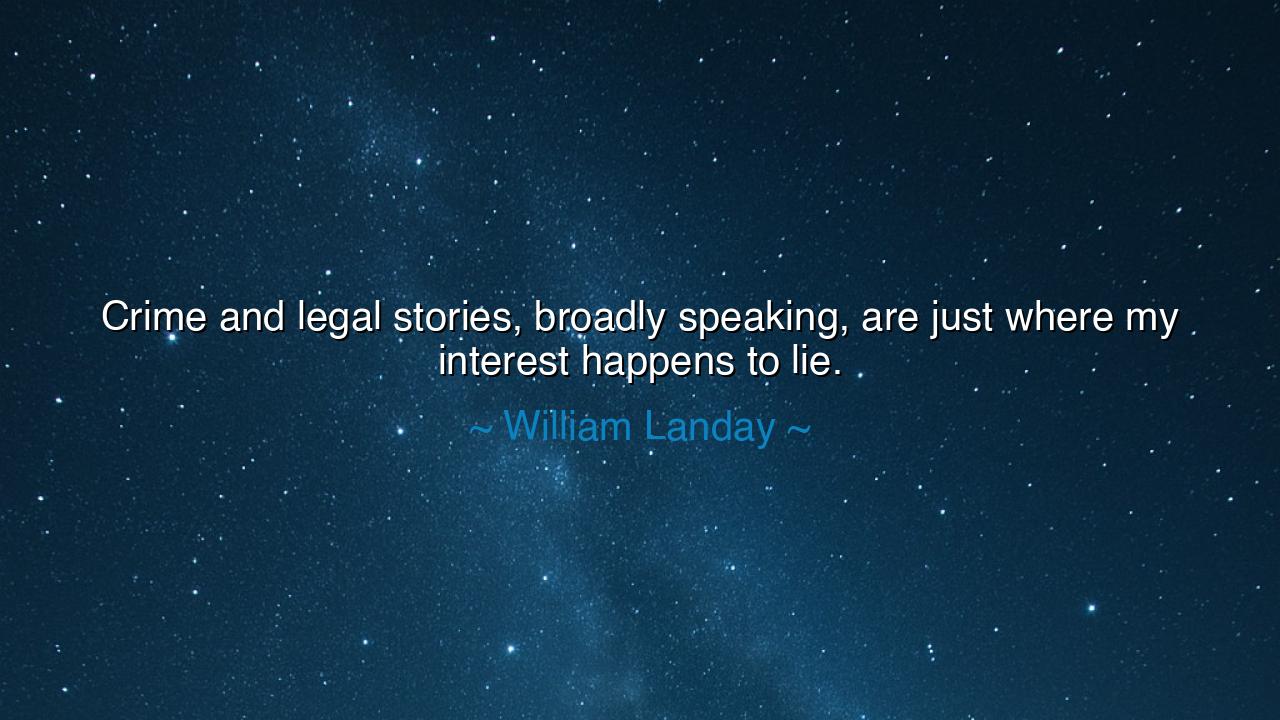
Crime and legal stories, broadly speaking, are just where my






There are souls drawn not to ease or comfort, but to the shadows where truth and deceit wrestle for dominion. When William Landay said, “Crime and legal stories, broadly speaking, are just where my interest happens to lie,” he revealed something profound about the human spirit: that fascination with justice, morality, and the frailty of human law is not mere entertainment—it is an ancient instinct. For in every age, from the courts of kings to the streets of modern cities, humanity has been enthralled by the question of guilt and innocence, of law and conscience, of the heart’s truth against the world’s judgment.
The origin of this quote springs from Landay’s life as both a novelist and a former prosecutor. He spent years in the service of the law, witnessing its glories and its failings—how justice can illuminate or betray, depending on who wields it. When he turned to writing, it was not escape but continuation: he began exploring through story what the courtroom could not express through verdicts. The quote, therefore, is not simply about preference—it is about calling. Landay’s interest lies where human nature is tested, where good intentions collide with hidden sins, and where the law—imperfect, yet sacred—tries to hold chaos at bay.
Since the dawn of civilization, mankind has sought stories that probe the boundary between justice and corruption. The ancients themselves understood this. In the plays of Aeschylus and Sophocles, law and fate contended beneath the gaze of the gods. In the Oresteia, the act of vengeance gives birth to the first court of law, where divine wrath is replaced by human judgment. And yet, even there, the poets asked: can law truly cleanse the soul? Can a verdict restore what was lost? Landay walks in the same footsteps as those dramatists of Athens—he explores not merely crime, but the moral labyrinth that follows every act of wrongdoing.
To be drawn to crime and law is to study the mirror of the soul. For every criminal act begins in darkness—a hunger, a fear, a moment when virtue falters. And every attempt at justice is a reflection of our desire to set the world right again. Landay’s fascination, then, is not with violence or suspense, but with the moral tension that defines existence. His stories, like Defending Jacob, reveal that the line between innocence and guilt is not fixed—it wavers within the human heart. The ancient philosophers called this tragic wisdom: the understanding that justice is always pursued, never fully attained, and that in seeking it, we learn what it means to be human.
There is a story told of King Solomon, the wisest of judges. When two women came before him, each claiming the same child, Solomon proposed to divide the infant in two. In that moment, the true mother revealed herself—not by argument, but by mercy. The tale endures because it shows that the law, without compassion, is an empty vessel. This same truth lies beneath Landay’s words: his interest in crime and law is an interest in the human element within justice—in how compassion, fear, love, and despair shape our moral decisions more deeply than any statute or code.
Landay’s fascination also speaks to a universal truth about storytelling itself. The greatest tales are born not from perfection, but from conflict. Crime and law are the stage upon which the soul performs its highest and lowest acts. To explore them is to explore the eternal struggle between chaos and order, darkness and light, self-interest and sacrifice. In every trial, whether in a court or within one’s conscience, there is a drama older than time: the pursuit of truth. Landay’s quote reminds us that such stories endure because they hold a mirror to our civilization—and to ourselves.
The lesson we may draw is both humble and profound: follow your curiosity into the depths, for it is there that wisdom hides. Landay’s interest “happens to lie” in crime and law, but the deeper meaning is universal—every soul must find the realm where its spirit awakens. For some, it is art; for others, science; for him, the battlefield of morality. The wise do not question where their fascination leads—they pursue it with courage, knowing that passion, rightly directed, becomes purpose.
Thus, Landay’s quiet confession becomes a teaching for the ages: that to be drawn toward the themes of justice, guilt, and redemption is not morbid curiosity, but reverence for the human condition. The courtroom, like life itself, is a place of judgment, but also of revelation. To understand crime is to understand temptation; to study law is to study the fragile hope that humanity can rise above its failings. And so, his words endure as an echo of the ancient pursuit: not simply of justice in the world, but of truth in the heart.






AAdministratorAdministrator
Welcome, honored guests. Please leave a comment, we will respond soon